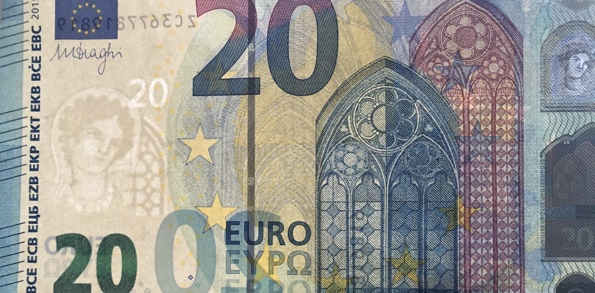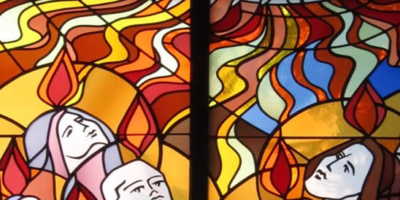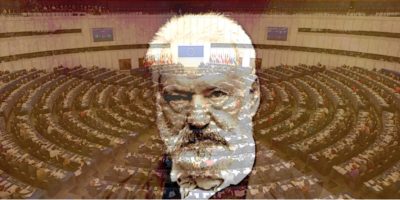When was the last time you held a banknote to the light to check the watermark? Maybe if you happen to be a bank clerk or a cashier at the check-out counter, you do that daily. But for the vast majority of us, we rarely think about it.
The Euro notes, for example, show a watermark of Europa, the Greek goddess. Which fits the secular narrative of the origins of Europe rooted in the Greek myth of the Phoenician princess abducted by Zeus disguised as a bull. And indeed European culture did begin with Greek and then Roman culture, before a dramatic transformation occurred when the story of Jesus changed the way people thought about God, the gods, and human life.
But it’s not Europa that pops up all the way through European history. It’s Jesus. Jesus is really the indelible watermark of European history. Even if the vast majority of Europeans are unaware of it.
“Regardless of what anyone may personally think or believe about him, Jesus of Nazareth has been the dominant figure in the history of Western culture for almost twenty centuries,” wrote Jaroslav Pelikan in the introduction to his fascinating book, Jesus Through the Centuries; His Place in the History of Culture.
Pelikan, of Eastern European origin, looks at Jesus in eighteen chapters through the lens of successive centuries starting with the original Hebrew context as a rabbi, through to the Cosmic Christ of the third and fourth centuries, the divine and human model rediscovered by Francis of Assisi in the thirteen and fourteenth centuries, the universal man of the Renaissance, the liberator of the nineteenth and twentieth centuries, and lastly, Jesus the world figure whose message goes to all peoples everywhere.
Secularist amnesia has robbed us of the awareness of how all-pervasive the person of Jesus has been through the centuries of European history.
Paradox
Over the past weeks and months I have faced the challenging task of writing study manuals for the master’s programme in Missional Leadership and European Studies which begins later this month. From after the Classical Era to the late Middle Ages, the story of Jesus is clearly the source of inspiration for the monasteries, the mission to the ‘barbarians’, the conversion of the Franks, Vikings and Slavs, even the rise of city states, and universities. (Oxford University’s motto to this day is: Dominus illuminateo mea – The Lord is my light).
From the Renaissance to the eighteenth-century Revivals, including the Reformation, the Religious Wars, and the rise of Reason, much upheaval is caused by new (mis)understandings of Jesus, his kingdom and how his followers should live.
The last two centuries of the second millennium straddle the period between the French Revolution (1789) and the collapse of communism (1989), when the rejection of the story of Jesus leads to a host of -isms, each of which are inescapably religious (with assumptions about the nature of reality and beliefs about individuals and society).
We find ourselves confronted then with the paradox of Europe as the continent most shaped by the story of Jesus and by the rejection of that story.
That is why we find it important to offer this three-year self-study degree, to equip (aspiring) teachers, politicians, lawyers, activists, journalists, church leaders, and anyone concerned about Europe’s future, for effective engagement in the public square. The degree programme is offered through ForMission College in Birmingham, UK, and validated by Newman University also in Birmingham, and includes three modules on European Studies facilitated by the Schuman Centre.
Creative minorities
The first module traces the Making of Europe though twenty centuries, no small undertaking! The second looks at the Contemporary Challenges and Opportunities facing us in Europe: including secularism, Islam, new spirituality and European unity. The third (elective) module is the two-week Continental Heritage Tour, every two years starting in 2020, focusing on the story of creative minorities who shaped Europe through their faith.
Students attend three or four facilitation days in Amsterdam each semester. Students can join the programme at the start of each semester. From June 17-20, the first intake of students will study the Making of Europe module at the De Poort Campus in Amsterdam. ForMission College has offered for anyone interested to join that week without formal application for the MA programme, to observe and participate, with the option of pursuing the course and receiving full credit for assignments turned in, on payment of fees.
If interested, contact me (jeff@schumancentre.eu), or admissions@formission.org.uk, tel +44 (0)121 458 5240.
Not ready to tackle an MA? Then how about the one-week Masterclass in European Studies this summer in Amsterdam, July 29-Aug 2? Open for all-comers. Professor Evert Van de Poll and I will share the teaching, and there will be exploration of the inner city looking for God at work today.
Till next week,



